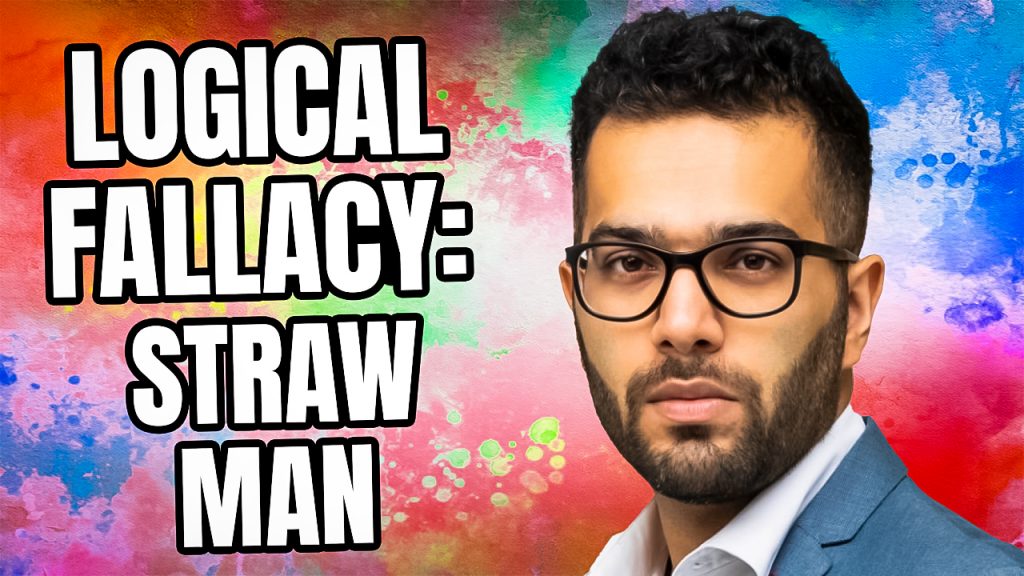Logical Fallacy: Straw Man

A straw man fallacy is a type of argumentative fallacy in which an argument or position is
misrepresented in a way that makes it easier to attack. Essentially, a straw man fallacy involves
taking a weak or exaggerated version of an opponent’s argument or position and then attacking
that instead of addressing the actual argument or position.
The term “straw man” comes from the idea of creating a weak, easily defeated opponent out of
straw, which is then used to distract from the actual argument or position. This fallacy is
commonly used in political debates and discussions, as well as in everyday arguments between
individuals.
To understand how the straw man fallacy works, it is helpful to consider an example. Imagine
that a person is arguing that we should increase funding for education in public schools. Their
opponent, who disagrees with this position, might use a straw man fallacy by misrepresenting
their argument as “throwing money at the problem” and suggesting that the original argument is
simplistic and uninformed. This misrepresentation of the original argument allows the opponent
to attack a weaker version of the argument, rather than engaging with the actual argument or
position.
There are several key ways in which the straw man fallacy can be used in arguments. One
common tactic is to take a statement out of context and then use it to build a straw man
argument. For example, a person might argue that “we should be careful when considering
immigration policies to ensure that we are not admitting individuals who pose a threat to national
security.” An opponent could use a straw man fallacy by misrepresenting this argument as
“immigrants are a threat to national security and we should not admit any of them.” By distorting
the original argument in this way, the opponent can attack a straw man argument that is easier
to defeat than the actual argument.
Another way in which the straw man fallacy can be used is by exaggerating an opponent’s
position to make it easier to attack. For example, imagine that a person argues that we should
take steps to reduce our carbon footprint in order to slow down the process of climate change.
An opponent could use a straw man fallacy by misrepresenting this argument as “we should all
stop using cars, airplanes, and any form of technology that relies on fossil fuels.” This
exaggeration of the original argument allows the opponent to attack a straw man argument that
is more extreme and easier to defeat than the actual argument.
The straw man fallacy can also be used by simply ignoring an opponent’s argument and instead
attacking a different argument that is easier to defeat. For example, imagine that a person
argues that we should legalize marijuana for medical use. An opponent could use a straw man
fallacy by misrepresenting this argument as “we should legalize all drugs and let people do
whatever they want.” By attacking this different argument, the opponent can avoid engaging
with the actual argument or position.
There are several reasons why the straw man fallacy is problematic in arguments. First, it is
dishonest and manipulative to misrepresent an opponent’s argument in order to make it easier
to attack. This undermines the integrity of the argument and can lead to misunderstandings and
confusion.
Second, the straw man fallacy can lead to a lack of productive dialogue and debate. If
opponents are not engaging with each other’s actual arguments or positions, then there is little
chance for meaningful discussion or compromise. This can lead to a breakdown in
communication and a failure to make progress on important issues.
Finally, the straw man fallacy can be harmful to individuals and groups who are already
marginalized or disadvantaged. By misrepresenting their arguments or positions, opponents can
further stigmatize and marginalize these groups, making it even harder for them to advocate for
their rights and interests.
In conclusion, the straw man fallacy is a type of argumentative fallacy that can be harmful to
productive dialogue and debate. It involves misrepresenting an opponent’s argument or position
in order to make it easier to attack, rather than engaging with the actual argument or position.
This fallacy can be used in a variety of ways, including taking a statement out of context,
exaggerating an opponent’s position, or simply ignoring their argument altogether.
This Post is Brought To You By BetterHelp